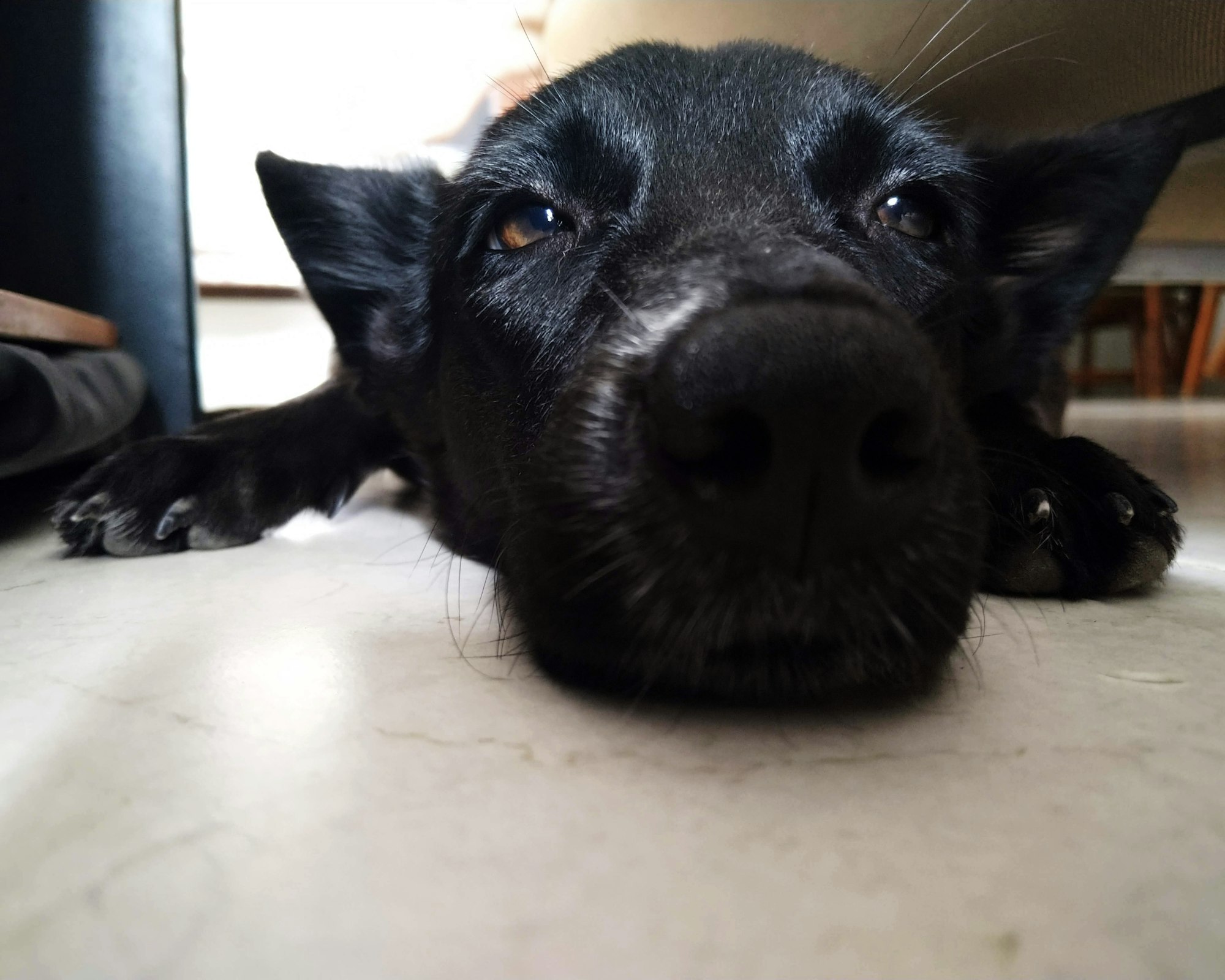As dog owners, we want our furry companions to live happy and healthy lives. However, just like humans, dogs can experience various health issues, and one of them is hemorrhoids. Although it might not be a topic that pet owners often discuss, understanding hemorrhoids in dogs can help identify and address this discomforting condition promptly. Here, we will explore what hemorrhoids are, their causes, symptoms, treatment options, and prevention measures to ensure your canine friend's well-being.

What are Hemorrhoids?
Hemorrhoids, also known as piles, are swollen and inflamed blood vessels located in the rectal area of dogs. These blood vessels play a crucial role in controlling bowel movements by regulating the flow of stool. However, various factors can lead to their swelling, causing discomfort and pain.
Types of Hemorrhoids in Dogs
Two primary types of hemorrhoids can affect our canine friends:
1. Internal Hemorrhoids
Internal hemorrhoids develop inside the rectum and are generally not visible externally. They can be challenging to detect, but some common symptoms include changes in bowel movements and the presence of blood in the stool.
2. External Hemorrhoids
External hemorrhoids, on the other hand, appear around the dog's anus and can be visible to the naked eye. These are often more uncomfortable and may cause itching and irritation.
Understanding the type of hemorrhoids your dog may be experiencing is crucial in determining the most suitable course of treatment and providing relief. If you suspect your dog has hemorrhoids or notice any symptoms, it's best to consult your veterinarian for proper evaluation and guidance.

Causes of Hemorrhoids in Dogs
Hemorrhoids in dogs can occur due to various factors, and understanding the underlying causes can help in preventing and managing this condition. Some common causes include:

- Chronic Constipation: When dogs experience difficulty passing stool, they may strain excessively, leading to the swelling of blood vessels in the rectal area.
- Diarrhea: Prolonged episodes of diarrhea can irritate the anal region and contribute to the development of hemorrhoids.
- Obesity: Obese dogs are more prone to developing hemorrhoids as the excess weight puts extra pressure on the blood vessels in the anal area.
- Prolonged Straining during Bowel Movements: Dogs that strain excessively during defecation can put stress on the blood vessels, leading to inflammation.
- Poor Diet: Diets lacking in fiber can cause constipation in dogs, making it difficult for them to have regular bowel movements and increasing the risk of hemorrhoids.
- Genetic Predisposition: Certain dog breeds may have a higher genetic predisposition to developing hemorrhoids.
- Age: Older dogs may be more susceptible to hemorrhoids due to weaker rectal tissues and decreased muscle tone.
- Inactivity: Lack of regular exercise can lead to poor bowel function, making dogs more susceptible to hemorrhoids.
As responsible pet owners, it is essential to monitor our dogs' diet, exercise, and overall health to minimize the risk of hemorrhoids. Ensuring they have a balanced diet, regular exercise, and access to fresh water can go a long way in maintaining their digestive health and preventing discomforting conditions like hemorrhoids. If you suspect your dog may have hemorrhoids or notice any symptoms, consult your veterinarian for proper diagnosis and appropriate care.
Identifying Symptoms
Recognizing the signs of hemorrhoids in dogs is crucial for timely intervention. Some common symptoms include:
1. Changes in Bowel Movements: If you notice your dog experiencing difficulty during bowel movements or having irregularities in their stool patterns, it could be a sign of hemorrhoids.
2. Discomfort and Pain: Dogs with hemorrhoids may exhibit signs of discomfort, pain, or restlessness, particularly during or after defecation.
3. Swelling and Inflammation: Inflamed blood vessels can cause visible swelling around the dog's anus, indicating the presence of external hemorrhoids.
4. Excessive Licking or Biting: Dogs may try to alleviate their discomfort by excessively licking or biting the affected area.
5. Presence of Blood: Finding blood in your dog's stool or on their bedding could be a sign of internal hemorrhoids.
Diagnosing Hemorrhoids
If you suspect that your dog may be experiencing hemorrhoids or notice any symptoms associated with this condition, it is crucial to seek professional veterinary advice. Diagnosing hemorrhoids in dogs typically involves a thorough examination by a veterinarian. Here's what you can expect during the diagnostic process:
- Physical Examination: The veterinarian will conduct a comprehensive physical examination of your dog, paying close attention to the anal area. They may gently inspect the rectum and surrounding tissues to check for any signs of swelling, inflammation, or external hemorrhoids.
- Medical History: Providing the veterinarian with your dog's medical history, including any changes in bowel movements, diet, or recent illnesses, can help in the diagnostic process.
- Stool Analysis: In some cases, the veterinarian may recommend a stool analysis to rule out other potential causes of symptoms, such as parasites or infections.
- Proctoscopy or Endoscopy: In more severe cases or when internal hemorrhoids are suspected, the veterinarian may perform a proctoscopy or endoscopy. These procedures involve using a specialized scope to examine the inside of the rectum and identify any internal hemorrhoids.
- Sedation or Anesthesia: Depending on the dog's temperament and the extent of discomfort, sedation or anesthesia may be used during the examination to keep the dog calm and ensure a thorough evaluation.
During the diagnostic process, it is essential to share any observations of your dog's behavior, such as changes in bowel habits, discomfort, or signs of pain around the anus. This information can assist the veterinarian in making an accurate diagnosis and recommending appropriate treatment options.
Remember, early detection and timely intervention can make a significant difference in your dog's comfort and overall well-being. If you suspect that your dog may have hemorrhoids or any other health concerns, do not hesitate to reach out to your veterinarian for professional guidance and care.
Treatment Options
The approach to treating hemorrhoids in dogs depends on the severity of the condition and the type of hemorrhoids present. In mild cases, home remedies and lifestyle adjustments may be sufficient to alleviate discomfort and promote healing. For more severe or persistent cases, veterinary intervention and medical treatments may be necessary. Here are some treatment options:
- Warm Compress: Applying a warm, moist compress to the affected area can help reduce swelling and soothe discomfort.
- Sitz Baths: For external hemorrhoids, a sitz bath can be beneficial. Fill a shallow basin with warm water and allow your happy dog to sit in it for a few minutes.
- Topical Creams: Some over-the-counter topical creams specifically formulated for good family dogs may provide relief from itching and irritation. However, always consult your veterinarian before using any medications.
- High-Fiber Diet: Feeding your dog a high-fiber diet can promote regular bowel movements and prevent constipation, which can aggravate hemorrhoids.
- Hydration: Ensure your dog has access to clean, fresh water at all times to stay hydrated, which also aids in proper bowel function.
- Your veterinarian may prescribe medications to reduce inflammation, alleviate pain, or address underlying issues contributing to hemorrhoids.
- For severe or persistent cases, surgical removal or reduction of hemorrhoids may be necessary. This is typically reserved as a last resort when other treatments have not been effective.
- After successfully treating hemorrhoids, preventive measures should be taken to minimize the risk of recurrence. This includes maintaining a healthy diet, regular exercise, and addressing any underlying health issues.
Preventive Measures:
Surgical Intervention:
Medications:
Dietary Changes:
Home Remedies:
It is essential to follow your veterinarian's advice and treatment plan to ensure the best possible outcome for your dog. Avoid using over-the-counter medications without professional guidance, as some products designed for humans can be harmful to dogs.

While home remedies and lifestyle changes can be beneficial for mild cases, always consult your veterinarian for proper evaluation and diagnosis. Prompt and appropriate treatment can help your furry friend find relief and get back to enjoying a comfortable and happy life.
Prevention Measures
Preventing hemorrhoids in dogs involves adopting a few lifestyle changes:
1. High-Fiber Diet: Feeding your dog a high-fiber diet can promote regular bowel movements and reduce the risk of constipation.
2. Regular Exercise: Encouraging regular physical activity helps in maintaining healthy bowel function.
3. Keeping Hydrated: Ensure your dog has access to clean and fresh water at all times to prevent dehydration and constipation.
4. Avoiding Straining: Prevent your dog from straining excessively during bowel movements by providing a comfortable and stress-free environment.
Caring for a Dog with Hemorrhoids
Caring for a dog with hemorrhoids involves providing them with the necessary comfort and support during their recovery. Here are some essential tips for caring for a dog with hemorrhoids:
- Create a Comfortable Resting Area: Provide your dog with a soft and comfortable resting place, away from rough surfaces that may irritate the affected area.
- Avoid Activities that Aggravate the Condition: Limit activities that may put additional strain on your dog's rectal area, such as jumping or running excessively.
- Regular Cleaning: Keep the anal area clean and dry to prevent infections. Gently clean the area with a damp cloth if needed, and avoid using harsh chemicals.
- Monitor Bowel Movements: Keep track of your dog's bowel movements to ensure they are not straining excessively. If you notice any changes, consult your veterinarian.
- Administer Medications as Prescribed: If your veterinarian has prescribed medications to alleviate discomfort or reduce inflammation, administer them according to the recommended dosage.
- Observe for Improvement: Keep a close eye on your dog's condition and watch for signs of improvement or any worsening symptoms.
When to Consult a Veterinarian
If you suspect your dog has hemorrhoids or notice any symptoms associated with this condition, it is essential to consult your veterinarian promptly. Early diagnosis and treatment can prevent the condition from worsening and ensure your dog's well-being. Here are some indications to seek veterinary advice:
- Persistent discomfort or pain
- Swelling and inflammation around the anal area
- Changes in bowel habits
- Presence of blood in the stool
- Excessive licking or biting of the anal area
- Restlessness or signs of distress
Your veterinarian will conduct a thorough examination, provide a proper diagnosis, and recommend suitable treatment options based on your dog's specific condition.
Addressing Underlying Health Issues
In some cases, hemorrhoids in dogs may be a symptom of an underlying health issue. It is essential to address these root causes to ensure effective treatment and prevent recurrence. Some underlying health issues that may contribute to hemorrhoids include:
- Digestive Problems: Chronic diarrhea or constipation can strain the rectal area and lead to hemorrhoids.
- Obesity: Overweight dogs may be more prone to developing hemorrhoids due to added pressure on blood vessels.
- Inflammatory Bowel Disease: Conditions like colitis can cause inflammation and irritation in the anal area.
Your veterinarian will work to identify and address these underlying health problems to improve your dog's overall well-being.
The Emotional Impact on Dogs
Hemorrhoids can cause discomfort and distress for dogs, affecting their emotional well-being. As responsible pet owners, it's essential to offer reassurance, comfort, and affection during this time. Create a calm and soothing environment for your dog and be patient with them as they recover.

Managing Hemorrhoids in Aging Dogs
Aging dogs may be more susceptible to hemorrhoids due to weakened rectal tissues and decreased muscle tone. If you have an older dog, pay close attention to their health and promptly address any signs of discomfort or changes in bowel habits.
Remember, your veterinarian is your best resource for guidance and care when it comes to managing hemorrhoids and ensuring your dog's overall health and happiness. Always follow their advice and treatment plan for the best outcome.
Conclusion
Hemorrhoids in dogs are a treatable condition, but early detection and appropriate care are essential. By understanding the causes, symptoms, and treatment options, you can ensure your canine companion's comfort and well-being. Remember to consult your veterinarian if you suspect your dog has hemorrhoids or any other health concerns.
FAQs (Frequently Asked Questions)
Q1: Can I use over-the-counter hemorrhoid creams on my dog?
A1: No, it is not recommended to use over-the-counter human hemorrhoid creams on dogs, as they may contain ingredients harmful to them. Always consult your veterinarian for suitable treatments.
Q2: Can hemorrhoids in dogs be prevented through diet alone?
A2: While a high-fiber diet can significantly reduce the risk of hemorrhoids, other factors like hydration and exercise also play a vital role in prevention.
Q3: Will my dog require surgery for hemorrhoid removal?
A3: Surgery is usually reserved for severe cases that do not respond to conservative treatments. Most dogs with hemorrhoids can be managed with home remedies or medications.
Q4: Are certain dog breeds more prone to hemorrhoids?
A4: While hemorrhoids can affect any dog breed, certain breeds may have a genetic predisposition to develop them.
Q5: Can stress cause hemorrhoids in dogs?
A5: Yes, stress and separation anxiety can contribute to the development of hemorrhoids in dogs, so it's crucial to create a calm and supportive environment for your pet.






